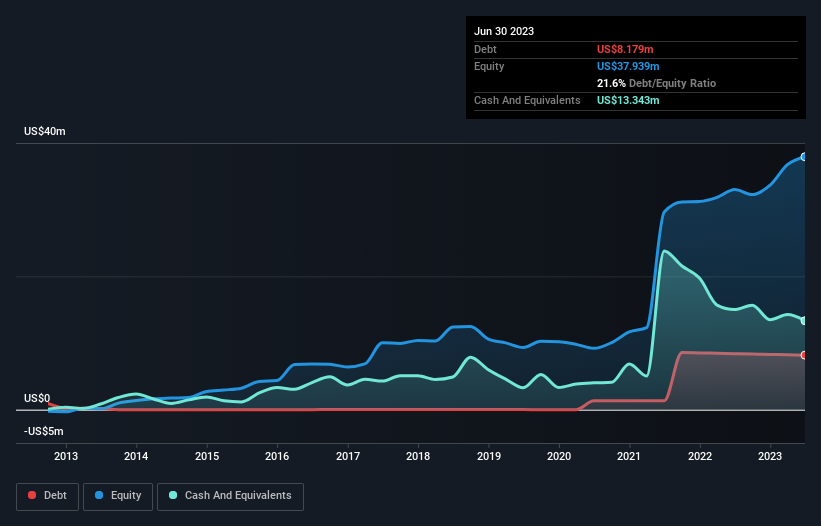- United States
- /
- Aerospace & Defense
- /
- NasdaqCM:VTSI
VirTra (NASDAQ:VTSI) Seems To Use Debt Quite Sensibly

David Iben put it well when he said, 'Volatility is not a risk we care about. What we care about is avoiding the permanent loss of capital.' So it might be obvious that you need to consider debt, when you think about how risky any given stock is, because too much debt can sink a company. We note that VirTra, Inc. (NASDAQ:VTSI) does have debt on its balance sheet. But the real question is whether this debt is making the company risky.
When Is Debt A Problem?
Debt is a tool to help businesses grow, but if a business is incapable of paying off its lenders, then it exists at their mercy. Ultimately, if the company can't fulfill its legal obligations to repay debt, shareholders could walk away with nothing. However, a more common (but still painful) scenario is that it has to raise new equity capital at a low price, thus permanently diluting shareholders. Of course, debt can be an important tool in businesses, particularly capital heavy businesses. When we examine debt levels, we first consider both cash and debt levels, together.
Check out our latest analysis for VirTra
What Is VirTra's Net Debt?
As you can see below, VirTra had US$8.18m of debt, at June 2023, which is about the same as the year before. You can click the chart for greater detail. But it also has US$13.3m in cash to offset that, meaning it has US$5.16m net cash.

How Healthy Is VirTra's Balance Sheet?
According to the last reported balance sheet, VirTra had liabilities of US$17.6m due within 12 months, and liabilities of US$10.9m due beyond 12 months. Offsetting this, it had US$13.3m in cash and US$20.4m in receivables that were due within 12 months. So it can boast US$5.14m more liquid assets than total liabilities.
This short term liquidity is a sign that VirTra could probably pay off its debt with ease, as its balance sheet is far from stretched. Simply put, the fact that VirTra has more cash than debt is arguably a good indication that it can manage its debt safely.
Even more impressive was the fact that VirTra grew its EBIT by 242% over twelve months. If maintained that growth will make the debt even more manageable in the years ahead. There's no doubt that we learn most about debt from the balance sheet. But ultimately the future profitability of the business will decide if VirTra can strengthen its balance sheet over time. So if you're focused on the future you can check out this free report showing analyst profit forecasts.
Finally, while the tax-man may adore accounting profits, lenders only accept cold hard cash. While VirTra has net cash on its balance sheet, it's still worth taking a look at its ability to convert earnings before interest and tax (EBIT) to free cash flow, to help us understand how quickly it is building (or eroding) that cash balance. Over the last three years, VirTra saw substantial negative free cash flow, in total. While investors are no doubt expecting a reversal of that situation in due course, it clearly does mean its use of debt is more risky.
Summing Up
While we empathize with investors who find debt concerning, you should keep in mind that VirTra has net cash of US$5.16m, as well as more liquid assets than liabilities. And it impressed us with its EBIT growth of 242% over the last year. So we don't have any problem with VirTra's use of debt. The balance sheet is clearly the area to focus on when you are analysing debt. However, not all investment risk resides within the balance sheet - far from it. These risks can be hard to spot. Every company has them, and we've spotted 2 warning signs for VirTra (of which 1 can't be ignored!) you should know about.
If, after all that, you're more interested in a fast growing company with a rock-solid balance sheet, then check out our list of net cash growth stocks without delay.
New: Manage All Your Stock Portfolios in One Place
We've created the ultimate portfolio companion for stock investors, and it's free.
• Connect an unlimited number of Portfolios and see your total in one currency
• Be alerted to new Warning Signs or Risks via email or mobile
• Track the Fair Value of your stocks
Have feedback on this article? Concerned about the content? Get in touch with us directly. Alternatively, email editorial-team (at) simplywallst.com.
This article by Simply Wall St is general in nature. We provide commentary based on historical data and analyst forecasts only using an unbiased methodology and our articles are not intended to be financial advice. It does not constitute a recommendation to buy or sell any stock, and does not take account of your objectives, or your financial situation. We aim to bring you long-term focused analysis driven by fundamental data. Note that our analysis may not factor in the latest price-sensitive company announcements or qualitative material. Simply Wall St has no position in any stocks mentioned.
About NasdaqCM:VTSI
VirTra
Provides use of force training and firearms training simulators for the law enforcement, military, and commercial markets worldwide.
Reasonable growth potential slight.
Market Insights
Community Narratives



